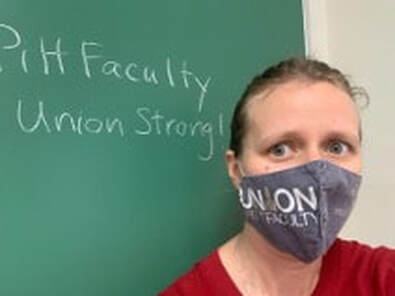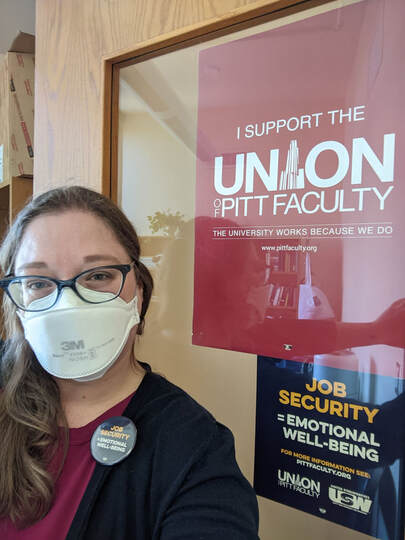Provost Cudd announced that the 2022-23 academic year will be the “Year of Emotional Well-being” at the University of Pittsburgh. We welcome this opportunity to, as the Provost states, “engage collectively with a focus on restoring and enhancing our emotional well-being.” For the 2/3 of the faculty who are on short-term appointments, a major challenge to our emotional well-being is the anxiety and stress of having to frequently renew our contracts. This environment of uncertainty is not good for our students, our research, our library patrons, or our patients.
The most straightforward way to improve our emotional well-being would be to eliminate the unnecessary precarity of our jobs. In July, our Bargaining Committee submitted a proposal to the administration for automatic contract renewals. This reflects our view that, if faculty are doing a good job and there is work for them to do, they should be able to keep doing it without having to reapply for their jobs. We call on the administration to accept this proposal to better our institution and the emotional well-being of our faculty.
In order to achieve these ambitious goals, we need to show that we’re united. Talk to a Communication and Action Team member in your area or email us at [email protected] to find out how you can show your support.
The most straightforward way to improve our emotional well-being would be to eliminate the unnecessary precarity of our jobs. In July, our Bargaining Committee submitted a proposal to the administration for automatic contract renewals. This reflects our view that, if faculty are doing a good job and there is work for them to do, they should be able to keep doing it without having to reapply for their jobs. We call on the administration to accept this proposal to better our institution and the emotional well-being of our faculty.
In order to achieve these ambitious goals, we need to show that we’re united. Talk to a Communication and Action Team member in your area or email us at [email protected] to find out how you can show your support.
TESTIMONIALS
After earning my PhD, I taught what I refer to as “full-time part-time” at several different institutions in western PA, including Pitt. I had a full course-load every semester, sometimes teaching five courses across three different institutions. I was lucky if I netted $20,000/year and I often didn’t know whether or not I would be teaching until a week before the semester began. This was an incredibly stressful experience. It got to the point that I considered applying to work at Target just to have a steady, reliable paycheck. It also wasn’t good for my students. I often had students ask me what other courses I would be teaching in the future and I had to tell them I didn’t know. Sometimes they would come to me later for letters of recommendation and I would have to inform them that I was no longer employed by the university, even though it was likely that I would be asked to teach again the following semester.
I was ecstatic when I was hired for a full-time teaching position at Pitt. However, I quickly learned that my job security had not improved much. Instead of being hired for a single term, my contract was now the length of two terms after which time renewal of my contract would be decided by a vote of faculty in my department. I am lucky to have some wonderful departmental colleagues, but I would be lying if I said that this renewal process doesn’t influence how I interact with them in committee work. The vagueness of the renewal process also leads to overwork since I feel compelled to say “yes” to every service request. This is time that I could and should be spending developing my courses and meeting with students. The current system accentuates differences in rank and belittles the role of non-tenure stream faculty who are largely responsible for fulfilling the academic mission of the university. I stand with our Bargaining Committee in calling on the administration to accept their proposal and institute automatic contract renewals for non-tenure stream faculty. It seems obvious to me that Pitt faculty should have at least the same level of job security as a clerk at Target.
Melinda Ciccocioppo, PhD
Teaching Associate Professor
Department of Psychology
I was ecstatic when I was hired for a full-time teaching position at Pitt. However, I quickly learned that my job security had not improved much. Instead of being hired for a single term, my contract was now the length of two terms after which time renewal of my contract would be decided by a vote of faculty in my department. I am lucky to have some wonderful departmental colleagues, but I would be lying if I said that this renewal process doesn’t influence how I interact with them in committee work. The vagueness of the renewal process also leads to overwork since I feel compelled to say “yes” to every service request. This is time that I could and should be spending developing my courses and meeting with students. The current system accentuates differences in rank and belittles the role of non-tenure stream faculty who are largely responsible for fulfilling the academic mission of the university. I stand with our Bargaining Committee in calling on the administration to accept their proposal and institute automatic contract renewals for non-tenure stream faculty. It seems obvious to me that Pitt faculty should have at least the same level of job security as a clerk at Target.
Melinda Ciccocioppo, PhD
Teaching Associate Professor
Department of Psychology
I’m a Research Assistant Professor with a wet lab research program. Relative to many of my non-tenure stream colleagues I’ve been fortunate to be employed on 3-year contracts. However, this certainly hasn’t removed the stress associated with contract renewal for myself, or for the students and staff who work in my lab.
The contract renewal process typically takes months. Last year I was told in January that my contract would be renewed. I didn’t receive a letter of reappointment at all and in late October it was finally confirmed by my School (via screenshot) that it had been approved at the Provost Office level. I had worked without a contract for four months! This situation makes it impossible to assure my lab staff that they still have jobs and my PhD students that they still have a supervisor and a lab in which to do their research! Additionally, this protracted process negatively affects my research line, preventing me from setting up longitudinal research studies and submitting grants as I don’t know if I’ll still have a job or access to facilities to complete the work. As someone who’s performance is solely evaluated based upon my ability to obtain extramural funding and research productivity this has real potential to harm my career long term.
I support our Union’s bargaining proposal to ensure automatic contract renewal. Commitment to faculty continuity not only improves student experience, but also maintains our ability to perform research of the highest global standard at Pitt!
Lea Sayce, PhD
Research Assistant Professor
Communication Science and Disorders
The contract renewal process typically takes months. Last year I was told in January that my contract would be renewed. I didn’t receive a letter of reappointment at all and in late October it was finally confirmed by my School (via screenshot) that it had been approved at the Provost Office level. I had worked without a contract for four months! This situation makes it impossible to assure my lab staff that they still have jobs and my PhD students that they still have a supervisor and a lab in which to do their research! Additionally, this protracted process negatively affects my research line, preventing me from setting up longitudinal research studies and submitting grants as I don’t know if I’ll still have a job or access to facilities to complete the work. As someone who’s performance is solely evaluated based upon my ability to obtain extramural funding and research productivity this has real potential to harm my career long term.
I support our Union’s bargaining proposal to ensure automatic contract renewal. Commitment to faculty continuity not only improves student experience, but also maintains our ability to perform research of the highest global standard at Pitt!
Lea Sayce, PhD
Research Assistant Professor
Communication Science and Disorders
At Pitt Dental Medicine, the vast majority of our faculty members are non-tenure and are on one-year contracts. It seems as though we have automatic contract renewals already, but this policy isn’t written down anywhere and the administration has no obligation to follow it. I joined the faculty in 2003. Since then, I was told only once that my contract would not be renewed for the following year. It was during a time of belt-tightening, and I think the dean was looking for ways to cut costs, but it was unclear why my contract would not be renewed when many of my colleagues had their contracts renewed. Fortunately, over winter break, my chair identified a new service position needed by the school and asked me to fill it. By adding this responsibility to my activities, he was able to persuade the dean to keep me on. I have always been puzzled as to why the school gives me one-year contracts when I get three- and five-year grants from federal agencies like the NIH and FDA. If I get a multi-year grant that covers my soft money obligation, why won’t the school commit to me for that time? Having automatic contract renewals stipulated in our contract would mean that I can rest assured that my contract will be renewed at lest for the life of my grants, unless I am not doing a satisfactory job. This would greatly improve my emotional well-being!
Deb Polk
Assistant Professor
Dental Public Health
Deb Polk
Assistant Professor
Dental Public Health
As an English Education Supervisor for the past thirteen years, I train, mentor, and evaluate the next generation of teachers. The state requires all preservice teachers to have professional supervision for certification. In this position, I rely on skills and conceptual understandings developed through my years as a high school English teacher, department chairperson, and technology integration coach in a local public school district. The University of Pittsburgh School of Education, where I earned an M.Ed. in English Education as well as secondary principal and curriculum and supervision certification, set a firm foundation for these professional opportunities and experiences. When I retired from full-time teaching, I was thrilled to be invited to join Pitt’s part-time faculty as a clinical supervisor.
I love working with preservice teachers and preparing them for certification and a teaching career; however, the stagnant pay and semester-by-semester contracts for clinical supervisors are unsettling. Although we start to work in August and continue until early June, we are only invited back to our positions for the following academic year in mid to late June at the earliest. This undermines our personal and professional planning. Moreover, our contracts are sent to us in early September at best. As a result, our university ID cards are renewed after we start initial field site visits, and they expire before our final visits. If we travel by public transportation to field sites or the university, our Pitt ID cards are not valid early or late in the semesters. Even more consequential to our well being, such short-term contracts demean us as professionals, especially after more than a decade (or even decades) of service.
My dedicated part-time professional colleagues in clinical field instruction and adjuncts in classroom instruction are highly qualified educators with advanced degrees and—in many cases—substantive practice experience. Certainly, automatic contract renewals based on satisfactory evaluations for part-time faculty support equity and emotional well-being of this essential two-thirds of Pitt faculty. My commitment to advocating for all part-time field instructors and adjunct faculty reflects the School of Education’s Mission-Vision statement: “We disrupt and transform inequitable educational structures...we shape practice and policy...we teach with and for dignity... we lead with integrity.”
Elaine Barron, English Education Supervisor
School of Education, Department of Teaching, Learning, and Leading
I love working with preservice teachers and preparing them for certification and a teaching career; however, the stagnant pay and semester-by-semester contracts for clinical supervisors are unsettling. Although we start to work in August and continue until early June, we are only invited back to our positions for the following academic year in mid to late June at the earliest. This undermines our personal and professional planning. Moreover, our contracts are sent to us in early September at best. As a result, our university ID cards are renewed after we start initial field site visits, and they expire before our final visits. If we travel by public transportation to field sites or the university, our Pitt ID cards are not valid early or late in the semesters. Even more consequential to our well being, such short-term contracts demean us as professionals, especially after more than a decade (or even decades) of service.
My dedicated part-time professional colleagues in clinical field instruction and adjuncts in classroom instruction are highly qualified educators with advanced degrees and—in many cases—substantive practice experience. Certainly, automatic contract renewals based on satisfactory evaluations for part-time faculty support equity and emotional well-being of this essential two-thirds of Pitt faculty. My commitment to advocating for all part-time field instructors and adjunct faculty reflects the School of Education’s Mission-Vision statement: “We disrupt and transform inequitable educational structures...we shape practice and policy...we teach with and for dignity... we lead with integrity.”
Elaine Barron, English Education Supervisor
School of Education, Department of Teaching, Learning, and Leading
My first day of class this semester was on 8/29/22. As an adjunct, I am not eligible to get my Pitt ID until September 1st or later. Yes, this is the case even though I’ve taught consistently every fall and spring since fall of 2018. And yes, you read it correctly. We are not “officially” employed until September 1st even when classes start before that, as they often do. Strange.
So, coming back to the first day of classes, I arrive at my room, and see the hallway is full of eager graduate students waiting to enter. We quickly realize that the classroom is locked, but should be easy to open. An active Pitt faculty ID is all we faculty need to enter various spaces in the social work suite. As you already know, I did not possess an active ID. This is not an ideal way to start the semester. Thankfully I found a very gracious environmental services staff person who opened the classroom for me. I propped the door open with a garbage can so that we would not be locked out when we took a break.
Even as an experienced teacher, I felt embarrassed and rather defeated having my first class of the semester start this way. It does not feel like the university is looking out for my emotional well-being if I can’t enter my classroom, can’t use the library to prep for my class, can’t access copiers or printers for class materials, can’t take the bus for free on the first day like my full-time colleagues. Delaying some class prep is highly stressful. Scrambling to find parking when the bus would have been a better option does not bring emotional peace. Unable to bring the print materials I want to class? I feel unprepared and flustered.
All of these issues can easily trickle down to erode the student experience as well. We work hard to make sure the pupils are impacted as little as possible. However, one important issue certainly affects the student experience, and we part-time folks have no control of it. Contracts are often distributed quite close to the start of a new semester, well after the course schedule is published. With this system of semester-by-semester contracts being decided so late, students often don’t know who their professor will be when they choose classes. Many have told me how frustrating this is.
Administration, if you truly care about our Emotional Well-Being, please make it a priority for ALL instructors to have what they need to start the semester. We part time folks are tired of these unnecessary roadblocks every term with these short-term, last-minute contracts and lack of essentials like a Pitt ID. Having an active ID on a modern college campus is incredibly important, and when we don’t have one, it feels like we are forgotten.
Laura McCarthy, MSW, LCSW, PCD
Part-time instructor
School of Social Work
So, coming back to the first day of classes, I arrive at my room, and see the hallway is full of eager graduate students waiting to enter. We quickly realize that the classroom is locked, but should be easy to open. An active Pitt faculty ID is all we faculty need to enter various spaces in the social work suite. As you already know, I did not possess an active ID. This is not an ideal way to start the semester. Thankfully I found a very gracious environmental services staff person who opened the classroom for me. I propped the door open with a garbage can so that we would not be locked out when we took a break.
Even as an experienced teacher, I felt embarrassed and rather defeated having my first class of the semester start this way. It does not feel like the university is looking out for my emotional well-being if I can’t enter my classroom, can’t use the library to prep for my class, can’t access copiers or printers for class materials, can’t take the bus for free on the first day like my full-time colleagues. Delaying some class prep is highly stressful. Scrambling to find parking when the bus would have been a better option does not bring emotional peace. Unable to bring the print materials I want to class? I feel unprepared and flustered.
All of these issues can easily trickle down to erode the student experience as well. We work hard to make sure the pupils are impacted as little as possible. However, one important issue certainly affects the student experience, and we part-time folks have no control of it. Contracts are often distributed quite close to the start of a new semester, well after the course schedule is published. With this system of semester-by-semester contracts being decided so late, students often don’t know who their professor will be when they choose classes. Many have told me how frustrating this is.
Administration, if you truly care about our Emotional Well-Being, please make it a priority for ALL instructors to have what they need to start the semester. We part time folks are tired of these unnecessary roadblocks every term with these short-term, last-minute contracts and lack of essentials like a Pitt ID. Having an active ID on a modern college campus is incredibly important, and when we don’t have one, it feels like we are forgotten.
Laura McCarthy, MSW, LCSW, PCD
Part-time instructor
School of Social Work
I’ve been teaching at Pitt since the fall of 2015. I was an adjunct for two years, then a visiting lecturer for three; with virtually no path to promotion after that, I’m now back to being an adjunct again. In my eight years at Pitt, I’ve been hired and re-hired by my department 12 different times. Recently, my department has gotten better about simplifying the re-hiring process, so I thankfully don’t always have to go through the redundant labor of re-applying for my job every three months. Still, after nearly a decade at the university, I find myself with no promise of being re-hired at the end of each semester and no means of securing my employment beyond the goodwill of my department chair and program directors.
I’ll say upfront that there are easy fixes to these problems. There are plenty of universities that offer automatic contract renewals for NTS faculty who have taught a set number of consecutive semesters, or that offer longer minimum contracts to save faculty from jumping through hoops like circus bears to re-apply for their jobs every semester. If the administration wanted a strong body of teaching faculty, these fixes should obviously be a priority.
I love the work that I do at Pitt. I make every effort to be a good instructor, and if my students’ OMET evaluations are to be trusted, then I can say confidently that I am good at my job. But it’s hard to feel invested in my job when the only thing that has kept me here is the continued generosity of my department administrators. Every semester, I find myself feeling more and more disconnected to the university. I constantly wonder: why should I invest so much time and effort in an institution that has invested so little in me—an institution that doesn’t think my eight years of good work is worthy of anything more than a three-month contract?
Being a part-time instructor at Pitt is a constant struggle to balance my commitment to my students and my commitment to my work with the increasing disillusionment that I feel toward the institution and my increasing feelings of worthlessness in the world of academia. Worse yet, I can’t help but worry that my disillusionment affects my students; it doesn’t take a genius to understand that faculty working conditions affect students’ learning conditions. It's shameful that Pitt apparently thinks so little of its own students that it doesn’t see fit to provide them the stability of faculty who will be present beyond a single semester. Since non-tenured faculty—regardless of our research or publication history—don’t typically get the luxury of course releases or sabbaticals, we are the ones who end up spending the most time with students. Why wouldn’t the administration want to provide its students with a more present and stable body of teaching faculty?
Tyler McAndrew
Part-Time Instructor
Department of English
I’ll say upfront that there are easy fixes to these problems. There are plenty of universities that offer automatic contract renewals for NTS faculty who have taught a set number of consecutive semesters, or that offer longer minimum contracts to save faculty from jumping through hoops like circus bears to re-apply for their jobs every semester. If the administration wanted a strong body of teaching faculty, these fixes should obviously be a priority.
I love the work that I do at Pitt. I make every effort to be a good instructor, and if my students’ OMET evaluations are to be trusted, then I can say confidently that I am good at my job. But it’s hard to feel invested in my job when the only thing that has kept me here is the continued generosity of my department administrators. Every semester, I find myself feeling more and more disconnected to the university. I constantly wonder: why should I invest so much time and effort in an institution that has invested so little in me—an institution that doesn’t think my eight years of good work is worthy of anything more than a three-month contract?
Being a part-time instructor at Pitt is a constant struggle to balance my commitment to my students and my commitment to my work with the increasing disillusionment that I feel toward the institution and my increasing feelings of worthlessness in the world of academia. Worse yet, I can’t help but worry that my disillusionment affects my students; it doesn’t take a genius to understand that faculty working conditions affect students’ learning conditions. It's shameful that Pitt apparently thinks so little of its own students that it doesn’t see fit to provide them the stability of faculty who will be present beyond a single semester. Since non-tenured faculty—regardless of our research or publication history—don’t typically get the luxury of course releases or sabbaticals, we are the ones who end up spending the most time with students. Why wouldn’t the administration want to provide its students with a more present and stable body of teaching faculty?
Tyler McAndrew
Part-Time Instructor
Department of English
I am currently in my fourth consecutive year as a Visiting Assistant Professor at the Bradford Campus. Each year, I am warned, may be my last. Not because there’s no work to do, because there is and the fact that I have had an overloaded semester every single one of those years is proof enough that there’s more than enough work to do; nor because I am doing an unsatisfactory job, obviously I must be doing well given how much work they are eager to give me; nor because I am unwanted, as my colleagues and supervisors have made me feel an integral part of the community. So why, then, is my position one of permanent precarity? It seems increasingly clear this situation is by design. Not the design of any one person, mind you, as Bradford is blessed with amicable relationships between administration and faculty and I personally quite like our senior administrators. No, it’s not a person doing this, but rather a series of responses to the exigencies of our endless succession of crises that is responsible. My first year here, Covid struck in the Spring and, even before it had, the great fear of the looming demographic apocalypse, the ever increasing embrace of academic prioritization valuing the majors students choose over the classes they take, and the perennial underfunding of higher ed by the commonwealth of Pennsylvania meant that it simply does not matter that my classes are full and well regarded by our students. This creates a contradiction that disservices the University just as much as it does me; I am always expendable and simultaneously always needed.
Well and good, I knew coming in that it was a rough job market, one that had never really recovered from the 2008 crisis. However, I love the work, am pretty good at it, and was in a good place for taking on risk. What I had not considered was the extra costs and burdens of constant precarity. While buying a house in Bradford is cheap, rent is not. Had I had any confidence that I might be able to work here for years, I’d have been able to buy instead of rent. Not only would it have been cheaper on a straight monthly expenditure basis, I’d also have built equity and had a higher quality of living as I’d obviously improve my own home to increase both comfort and health in ways that landlords have zero incentive to. I’d have put roots into both the local and university community more quickly, participating in events and organizations as a member of the community instead of a simple perennial visitor. Automatic contract renewals would permit that forward thinking, forward planning kind of continuity necessary for a thriving community. It’s a simple change, one that would simply require the university to opt out of renewing a contract rather than opting into. The much valued flexibility for administration would be preserved intact while, at the same time, the stability and quality of life of the faculty who do so much of the work of the university would be improved. At zero cost to the university, both our lives and livelihoods would be made better. I’ve heard the university say they care about our well being, and I’d say that this is their chance to put their money where their mouth is, but this wouldn’t even cost them anything. Either Pitt believes that we deserve the dignity of remaining employed while there is work to do or they desire making us sweat while we jump through hoops to reapply for our jobs every time a contract is up.
Birney Young, PhD
Visiting Assistant Professor
Division of Comm and the Arts, Pitt-Bradford
Well and good, I knew coming in that it was a rough job market, one that had never really recovered from the 2008 crisis. However, I love the work, am pretty good at it, and was in a good place for taking on risk. What I had not considered was the extra costs and burdens of constant precarity. While buying a house in Bradford is cheap, rent is not. Had I had any confidence that I might be able to work here for years, I’d have been able to buy instead of rent. Not only would it have been cheaper on a straight monthly expenditure basis, I’d also have built equity and had a higher quality of living as I’d obviously improve my own home to increase both comfort and health in ways that landlords have zero incentive to. I’d have put roots into both the local and university community more quickly, participating in events and organizations as a member of the community instead of a simple perennial visitor. Automatic contract renewals would permit that forward thinking, forward planning kind of continuity necessary for a thriving community. It’s a simple change, one that would simply require the university to opt out of renewing a contract rather than opting into. The much valued flexibility for administration would be preserved intact while, at the same time, the stability and quality of life of the faculty who do so much of the work of the university would be improved. At zero cost to the university, both our lives and livelihoods would be made better. I’ve heard the university say they care about our well being, and I’d say that this is their chance to put their money where their mouth is, but this wouldn’t even cost them anything. Either Pitt believes that we deserve the dignity of remaining employed while there is work to do or they desire making us sweat while we jump through hoops to reapply for our jobs every time a contract is up.
Birney Young, PhD
Visiting Assistant Professor
Division of Comm and the Arts, Pitt-Bradford
My name is Marcelle Pierson, and I’m a Teaching Associate Professor in the Department of Music. As someone with a three-year contract, I could certainly speak to how the renewal process generates unnecessary anxiety and labor for myself. But instead, I want to talk about how it impacts the many part-time instructors with whom I work closely. I coordinate a few courses in our department, mainly taught by part-time faculty. Like many departments, Music's hiring of full-time faculty has not kept up with student demand for our services; as a result, a large number of important classes, both for majors and general education students, are taught by part-time faculty. The fact that they have to be re-hired at the beginning of every semester is a nightmare. They can't tell students who want to take another class with them what they'll be teaching until well after it would be useful for registration. They often don't have bus or library access until a week or more into the semester during fall term, making it incredibly difficult to do their job. Because of these avoidable humiliations, combined with the constant precarity and low pay, the level of burnout is extremely high and we hemorrhage valuable people. When we lose valuable people, we also lose valuable faculty, staff, and administration time in trying to replace them, even though they were doing a good job and there was work for them to do. This scenario has played itself out repeatedly in my time in this position at Pitt, and I think that our proposal makes commonsense suggestions to improve this system and ease the administrative burden of constant hiring. Provost Cudd, I hope you will consider supporting it.
My name is Ellen Lee. I’m a Teaching Assistant Professor and Language Programs Coordinator in the Classics department of the Oakland campus. I’ve been at Pitt since 2019. Despite consistently receiving excellent teaching and peer evaluations and there being demand for the courses I teach (as well as earning national recognition for my pedagogy work), I had to go through the renewal process to keep my job last year. The uncertainty about the future of my employment wasn't just stressful for me and my family, it has also created problems for my students and for curriculum development in my department. My working conditions are students' learning conditions. I spent all last year unable to assure students that I would be around to teach future classes or advise their thesis projects or write letters of recommendation for them. In addition, the time that I spent preparing materials for the onerous renewal process could have been far better spent meeting with students, giving feedback on assignments, or developing my courses. I had, for example, planned to propose two new high-demand courses for this year, but I found out that my contract had been renewed far too late to get the courses added into the registrar's system for this Fall. Further, my department has lost several excellent non-tenure stream faculty in the past few years due to the uncertainty and stress of constant renewals; this instability has cost students their advisors and burdened the remaining faculty to the point of burnout. I urge you to consider our Bargaining Committee’s position that NTS faculty should have their contracts automatically renewed provided they are doing a good job and there is work for them to do. This would cost the university nothing and would have a huge impact on my and my colleagues' emotional well-being and the well-being of my students.
Dr. Ellen Cole Lee (she/her)
Teaching Assistant Professor & Languages Program Coordinator, Department of Classics
Linguistics & Languages Communication & Action Team Co-Coordinator, Union of Pitt Faculty
University of Pittsburgh
I support the Pitt Faculty Union!
Dr. Ellen Cole Lee (she/her)
Teaching Assistant Professor & Languages Program Coordinator, Department of Classics
Linguistics & Languages Communication & Action Team Co-Coordinator, Union of Pitt Faculty
University of Pittsburgh
I support the Pitt Faculty Union!










